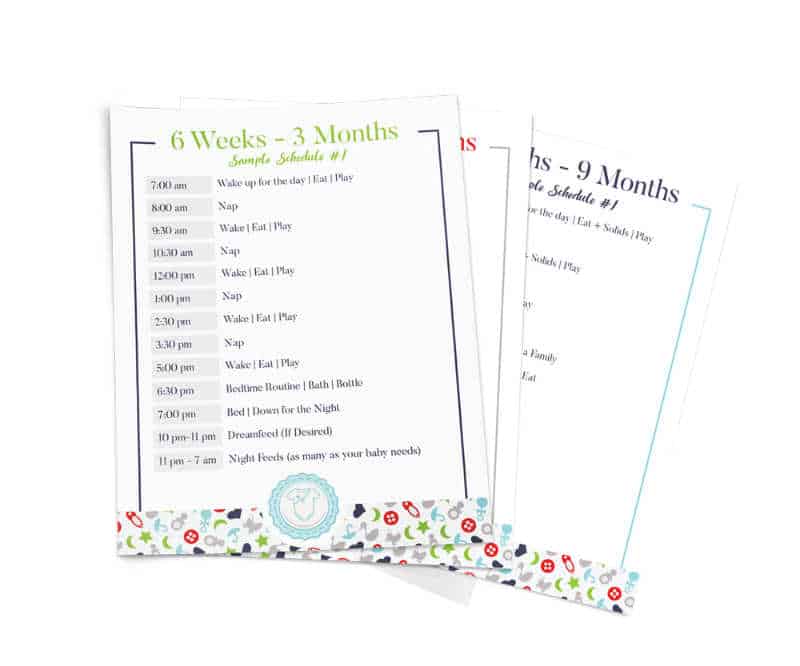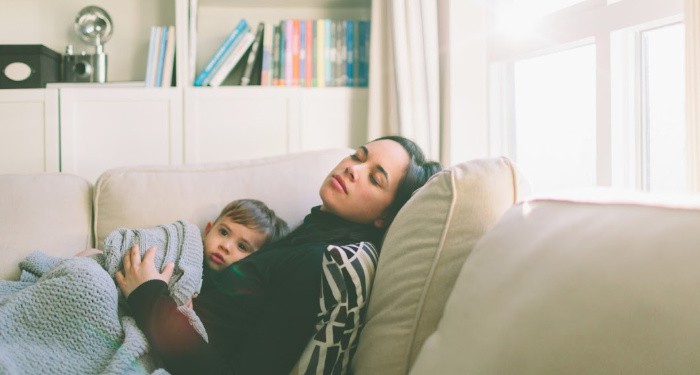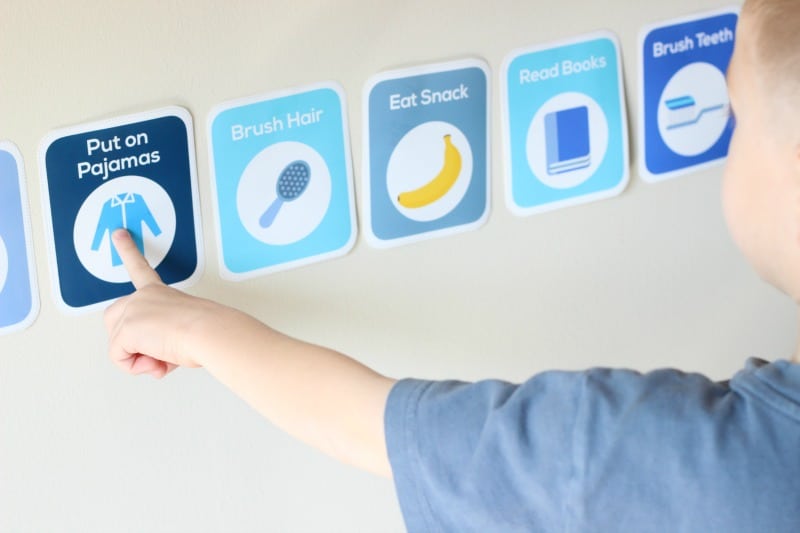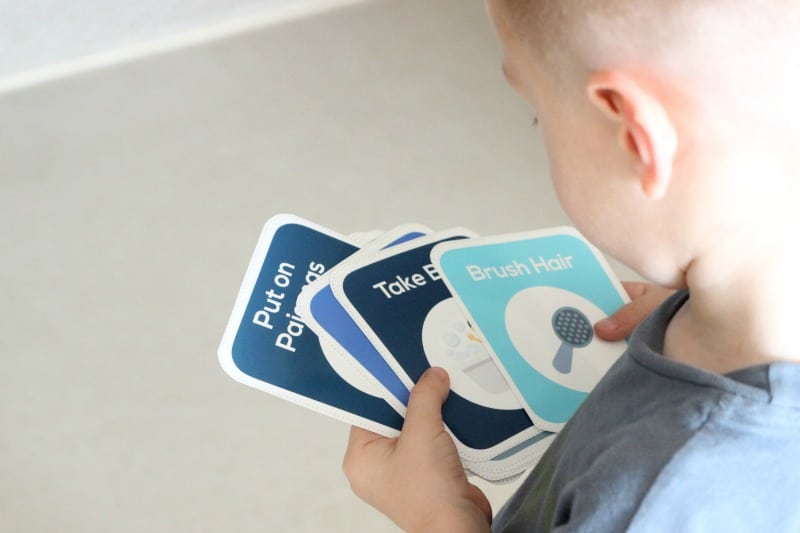Let’s face it, the right 2 year-old sleep schedule can take each family member’s sleep and daily routine from completely off tilt to pleasant and enjoyable.
That’s because when 2 year-olds aren’t happy, it tends to spill over into everyone else’s emotional space.
I remember when my daughter went through her 2 year old sleep regression. Each night she’d either come out of her room 57 times or she’d stick her fingers out the bottom of the bedroom door in a crying plea to let her out.
Not exactly the relaxing evening we were all hoping for.

Then on top of all that, when a two year old isn’t sleeping well, they start throwing more temper tantrums, followed by incessant whining and a good dose of back talk. Without realizing it, you’re now dealing with a very strong willed toddler.
I rounded up several 2 year-old sleep schedules from stay-at-home moms who currently use and loved them. (You want to know that they actually work!)
Plus, you’ll learn…
- Ideal bedtime and wake up times
- Sample 2 year old nap schedules
- Sleep cycles of a 2 year old
- Tricks for handling sleep regression
- Secrets to overcoming bedtime battles
Sleep schedules for 2 year-olds that work.
Check out my sample sleep routines for toddlers that help kids fall asleep faster and wake up happy. I’ve included three specific samples below that you can customize for your child.
What time should a 2 year-old go to bed?
In my experience and in working with hundreds of parents, ideal wake times are between 6-8 am and ideal bedtimes are between 6-8 pm. Toddlers naturally fall into a circadian rhythm that is ballpark similar to when the sun sets and rises.
An early bedtime routine can also play a significant role in kids falling asleep faster and waking up rested. That’s because toddlers sleep the deepest between 8 pm and midnight. Protect this time as much as possible for a happier toddler!
My favorite toddler bedtime is 7:30 pm with a 6:30 am wake up time, creating a ballpark estimate of 11 hours of nighttime sleep. Knowing that most two year-olds need 12-14 hours of sleep in a 24 hour period, this leaves 1-2 hours for an afternoon nap. This is when I’ve seen my toddlers the happiest!
Sample schedule #1 – 24 month old
- 7:30 am Wake up | Read | Play | Quiet time
- 8:15 am Breakfast
- 9:00 am Outdoor play, outings, errands, activities, etc.
- 12:00 pm Lunch (25+ Easy, Healthy Lunches for 2 Year Olds)
- 1:30 pm Nap
- 3:00 pm Wake up
- 3:15 pm Snack
- 5:45 pm Dinner
- 7:15 pm Get ready for bed
- 7:30 pm Reading with mom or dad
- 8:00 pm Bedtime
Sample schedule #2 – 28 month old
- 7:45 am Wake up | Eat breakfast | Get ready
- 8:30 am Activity lesson
- 9:15 am Park time
- 10:00 am Playtime at home
- 12:00 pm Lunch
- 1:30 pm Nap time
- 3:30 pm Wake up | Snack
- 6:00 pm Dinner
- 7:30 pm Bath
- 8:00 pm Bedtime routine | Books | Prayers
- 8:30 pm Bedtime
Sample schedule #3 – 30 month old
- 6:30 am Wake up time | Make bed | Get dressed
- 7:00 am Breakfast | Clean up kitchen with parent
- 7:30 am Play
- 8:30 am Simple chores
- 9:30 am Outside play | Snacks
- 10:30 am Independent play
- 11:30 am Lunch | Clean up
- 12:30 pm Naptime
- 2:00 pm Wake up
- 2:30 pm Park | Exercise | Outside time
- 4:00 pm Screen time | Cook dinner
- 5:30 pm Dinner | Family time
- 6:30 pm Bedtime routine
- 7:30 pm Bed
Find 20+ daily schedules for baby, toddler and kids ages 0 – 5 in Routines, Rhythms and Schedules.
If you’re looking for all things routine, check out our Daily Routine Bundle with checklists, visual routine cards, chore cards, baby routine cards and the routines book.

Nap schedule tips and tricks for a smooth transition.
There are several general rules I like to follow when it comes to toddler naps.
1. Keep nap times to as close to after lunch as possible.
If a toddler has enough morning activity and then eats a reasonable lunch, they will start to feel sleepy shortly after eating. Waiting too long can result in a toddler catching a second wind and then refusing to nap.
2. Sleep begets sleep.
2 year olds love to let grown ups think they do not need a nap. Don’t be fooled. Their brains are rapidly growing and developing at this age. Sleep helps their brain process and make sense of information.
Ideally, a two year old will get sleep after about 5-6 hours of wake time in the morning and then have about 4-6 hours of remaining wake time after the nap is over. So for example, if your child wakes up at 7 am, the ideal time to start an afternoon nap would be around 12 or 1 pm (5-6 hours later). They would wake up around 2 or 3 pm and go to bed around 7-8 pm (5-6 hours after waking from a nap).
3. End naps a minimum of 4 hours before bedtime.
Waking a two year old from their nap at least 4 hours before bedtime, helps ensure they aren’t going to be awake until 10 pm each night.
My preference is to stick with waking a child 5+ hours before bedtime, but I understand that sometimes the afternoon gets busy and a toddler might not fall asleep for a nap until 3 or 4 pm.
4. Nap duration ranges from 45 minutes to 3 hours.
The length of your child’s nap should really depend on how much night time sleep they are getting. Ideally a 2 year old will get around 12-14 hours of total sleep in a 24 hour period. You can use that number to help gauge how long your child’s nap needs to be.

Understanding basic 2 year old sleep cycles.
I’m often asked by parents what are the sleep cycles most common for a toddler?
There are 2 types of sleep that we cycle through many times each night. You probably heard this before; however, what makes it different is these cycles last 45 – 60 minutes in children (vs. 90 minutes in adults).
- “Deep” or Non-Rapid Eye Movement (NREM) sleep makes up 75 percent of our sleep. During deep sleep, muscle blood supply is increased, energy is restored, and essential hormones for growth and development are released.
- “Light” or Rapid Eye Movement (REM) sleep makes up 25 percent of our sleep. During light sleep, our brains are active and dreaming occurs. Our bodies become still and breathing and heart rates are irregular.
Regarding sleep cycles there is no optimal number of sleep hours that applies to all kids.
What amount of sleep do toddlers need?
Per the National Sleep Foundation, most 2 year olds need around 12-14 hours a day. Charts are wonderful, but they can only give you a ballpark estimate because they do not take into account your child’s individualized sleep needs.

Sleep requirements are influenced by growth rates, stress, disease, and other aspects of your child’s physical condition. They may also be influenced by genetics. Sleep patterns also vary significantly across cultures. For example, in China toddlers and preschoolers tend to get less nighttime sleep but make up for it during the day with longer naps.
Related: 7 Common Challenges for Parents of Babies and Toddlers (With Solutions)
Navigating toddler sleep regression like a pro.
2 year old sleep regression is a huge challenge point for parents. It’s a time where toddlers are really coming into their own selves and wanting to test boundaries in order to make sense of the world.
If your child is struggling with sleep problems bedtime, my first suggestion is to try an earlier bedtime. Move bedtime up to a half-hour earlier for at least a week. When kids are too tired, the brain gets excited and refuses to shut off.
If your toddler is struggling with separation anxiety, climbing out of the crib, waking early, refuses to nap or naps too long, or wakes up a lot at night, I wrote in detail about how we handled our toddler’s sleep regression here.
If potty training is causing sleep regression, skip the night time potty training until your child is older and just stick with day time potty training. I promise, it will automatically happen when your child is physically ready for the change. Here’s my take on potty training a toddler without going insane.
How to handle night waking?
- Make sure to only use red night lights. Any other light color during a night waking will send your toddler into full awake mode!
- Toilet your child or change a diaper depending on where your toddler is at with potty training.
- Offer comfort. Kids are often wanting to connect. Refusing to connect can cause them to escalate further.
- Take your child back to bed. Help them feel connected to you even when you’re not there (examples could be an old shirt of yours they cuddle with or a mommy doll.)
- Think about root causes. If your toddler keeps getting out of bed, be sure to check out these solutions.
Handling bedtime battles with visual routine cards.
Toddlers are not the best verbal word communicators. They are excellent verbal sound communicators – crying, moaning, and squealing for joy 🙂
Which is why it’s no surprise that toddlers seem to struggle so much with following directions. The good news is that a visual routine for toddlers and preschoolers is an excellent work around.
You can start by printing and creating your own toddler bedtime routine. Allow your child to help you put the cards in order and choose a place that is easy for them to access.

(Note: These cards also work well to create a complete daily schedule for kids.)
As you’re helping your 2 year old get ready for bed, offer as many choices that fit within your boundaries. All kids have 3 basic needs: Power, experience and connection, and they will all show up big time at bedtime.

To help meet your child’s need for power, allow them to make small decisions throughout the routine:
“It’s time to get your pajamas on. Show me which ones to help you with…this one or this one. OH, I picked the wrong one. Let me grab the other one for you.”
“It’s time to brush your teeth. You want to brush your teeth or should I? Tell me who should put the toothpaste on.”
Offering children some really small ways to feel powerful helps them avoid the controlling kid drama. It also has the magical ability to help you keep the your boundary of “it’s bedtime.”
It also helps meet your child’s need for connection with you.
And when kids feel powerful and connected, they are a lot more willing to cooperate with bedtime and skip the fight of coming out 57 times or crying in plea to “Let me out, mama.”
Print this free toddler listening checklist.
This post comes with a free printable checklist to help with toddler listening. I always have the hardest time remembering these phrases. This printable simplifies it!
Here is a sneak preview…
Download Your Free Printable
- Download the checklist. You’ll get the printable, plus join 37,000+ parents who receive my weekly parenting tips and ideas!
- Print. Any paper will do the trick, but card stock
would be ideal.
- Place it on your refrigerator. Check things off as you go and don’t forget a thing!
Want more on toddler routines?
- How to Help a Toddler Fall Asleep Fast
- 2 Year Old Not Listening? Try This Remarkable Tip
- 5 Sample Daily Toddler Schedules from Real Moms
- An Easy Peasy Response for a Toddler Not Listening That Works
- More 1 Year Old Sleep Schedules From Parents
- 4 Year Old Sleep Schedules – Easy to Use With Examples
I've created a free email series just for you! If you are struggling with finding a routine, rhythm or schedule, this email series will help you find one that will work for YOUR family. Yes, really. I've seen my sample routines work time and time again for parents. I know it can work for you too.
This free email series will help you:
- Free sample routines for your child
- Best morning routine tips and tricks your kids will actually follow
- All-time favorite parenting hacks for getting more cooperation at bedtime
- Step-by-step guide for using a printable daily schedule with kids











No No and again No so wrong it’s unreal firstly no child over a maximum of 13/14 months needs to nap in the day and should not be in a cot either it’s pure laziness and done for the parents benefit not the child’s. Secondly children this young should be going to be at 7pm absolutely no later 8/9 pm is far too late they don’t start going to be at this time until they are over eight years old at least. Children this age should not be getting any screen time at all accept maybe a little tv. no phones, no tablets/iPads, no computers/ laptops they don’t need these until they are a minimum of 10/11 years old.
Yes, they do need naps and it’s not solely for the parents. If my toddler doesn’t get a nap during the day she’s an absolute terror and sleeps horribly at night. When she gets her nap in, she sleeps great and it “better behaved.” You can’t expect a 14 mos old to be awake for 12 hours without needing naps at all. That just doesn’t make sense.
There is heaps of research about young children still needing naps until about 3. Not sure why you would think this is laziness and not fulfilling the child’s needs. As someone who has been a nanny for many families and now have my own, they get overtired and cranky if they don’t have 1 nap during the day. Which makes dinnertime a nightmare, and a smooth bedtime pretty tough to achieve.
As for screens, I do agree with you on that point. That’s just my parenting preference.
Sarah Louise, you are very clear on your boundaries surrounding naps, bedtime and screens. Those are your preferences and you’re ready to honor them. Our readers come from a variety of different backgrounds. Some choose to incorporate screens on a limited basis. Some choose to continue naps until their child starts kindergarten. And some parents choose to have a later bedtime for their child. There’s always a reason why parents do what they do, and the question I always ask is this: “Why would a great parent do something in that way?” A simple answer is that it is their preference or boundary! My goal is to help parents find simple strategies and tools (sample sleep schedules included!) that they can integrate into their own preferences and boundaries, rather than assume a one-size fits all approach.
I think this article and it’s advice are a fantastic aid for a mother currently suffering sleep regression with a just two year old.
I’m no expert but your response is heavily subjective and opinionated. All children have differentiating sleep needs and differ with napping needs. Families schedules are varied and children may need to get up early and have shorter sleep cycles due to people’s work and getting their children to childcare.
Saying it is selfish on a parent to put their child to rest for a day nap is ridiculous. All humans can benefit from a nap, regardless of age. The mind and body may need rest, depending on their lively hoods. Little minds above 14 months in my experience as a mother, friend, aquintance and family of parents with children, all have different situations. And I personally worked 12 hours shifts and appreciated seeing my child when I got home to do bedtime with otherwise we would miss out on bonding time for a stretch of days. That’s not selfish in my mothering make up, its critical. So my advice to your thoughts on this subject, are to think more outside the box and how other people live as parents and care takers, besides your guilt tripping parent shaming mentality.
Ha! If my 25 month old child gets a full night’s rest and misses his afternoon nap he’s a total clutch, absolutely injury prone and gets nightmares, sleeping awfully that night. He also gets bags and dark circles under the eyes, has trouble speaking and is an emotional mess. So, yes, naps are CRITICAL for little ones. These tips are spot on, military wife and mom! Thanks for sharing your wisdom!
I’m genuinely baffled by this comment. Not only does research support how important sleep is for kids, it also emphasizes how important sleep is for development, growth. and learning. It would be irresponsible for a parent NOT to provide their child with adequate sleep. Sure, some kids do try to drop their nap early but often kids convince their parents of this with a sleep regression despite the fact most need a nap up to the ages of 4 or 6.
Any advice on a 2 year old and 4 year old sharing a room. We just recently moved them into the same room and now as soon as one wakes up in the morning ( at like 5 am when its still pitch black outside) they wake the other up and it becomes impossible to get them to go back to sleep. This is throwing off our whole schedule and leaving my kids so behind on sleep! Moving them back into different rooms is unfortunately not an option. We know how important sleep is and it makes a HUGE difference in how our children act.
Hello! We have a similar routine, but my 14 month old is inconsistent with brushing her teeth! How did you get yours to brush his teeth? I’ve looked online for tips and sometimes those tips work (distractions, singing songs, choosing her toothbrush, etc), other times, she flat out refuses and I don’t want to create a negative experience or pressure to do this, but I also don’t want to create a bad habit of her knowing she can get away with it. It’s a struggle! Also do you have him brush his teeth in the morning too? Or am I being extra… lol!
Not sure if you’ve figured it out yet – but we do stickers. Our toddler gets a sticker whenever she lets me brush her teeth. We’ve been working up to two minutes of teeth brushing (we’re at 1:30 so far). She really loves stickers so it worked and it wasn’t a food related treat.
Ultra soft and small toothbrush combined with zylitol tooth gel that can be swallowed; it has a slightly sweet taste, naturally, but no sugar, and it strengthens the teeth. Win, win!
Great article! Thanks for sharing.
I’ve never struggled with my now 2.5 year old baby, he’s always been easy to put to sleep since birth.
He’s been having 1 nap a day naturally depending on how much he slept the previous day, I try not to pressure him or put a fixed time for the nap, but I’ve only now learned that, normally, they’d nap 5-6 hours after they wake up. This will make my life even easier because, previously, I thought he’d nap the same hour every day, but now I understand this better and it makes sense!
Thank you for writing this, great advice!
I have a 22 month old boy who has completely lost his routine. We live in a small studio apartment and I have to work from home. He is up all night either running around or crying. I tried a few different sleep routines although nothing seems to work. Is there any way to get those out of this habit as he used to be a brilliant sleeper when he was a baby.
My child had a regression and was getting enough sleep but at odd hours like 3am to 1pm. And like yours running and whining if said to be out to bed. I discovered screen/tv time was too close to bed time. I also read that it should be off for an hour before bedtime routine so I started with that. But at first of course my child would throw a tantrum so what I did instead was at 7 or 8pm depending on wake time I would put on a lullaby video on YouTube on the big screen and the song melody would mellow my child, of course the first two days there is crying and resistance but she got used to it and then after 30 min I would turn the tv off and she would be distracted by then and not mind. Then start the bed routine, as time passed, the lullaby had to be on for 10 minutes and she would smile at its sight. Also the alternative would be a bath because that would kill energy with her playing in there and mellow/tire her out. Important go do this every day. I guess ask yourself what would calm/soothe/mellow your child’s energy. These were the solutions for mine.
Just started the sleep regression. Found that a 1 1/2 hr nap is essential to avoid meltdowns . What worked for me was 7:45 tv off . Bright lights off , then 4 stories of her choice . She still likes a bottle at night and likes to be rocked . 5 oz of milk and singing along with the lullaby, then quiet time with just the lullaby works great. Fast asleep before 8:30. I just started this routine but it seems to be working well for me.
Hello, my 22month old son is sleep trained but recently had his tonsils removed and since then I have struggled to get him self settling at bedtime. He settles perfectly every day for his nap but just expects us to rock him to sleep on our knee at night. What do you think could be making this worse? He is always awake for 4+hours between nap & bedtime.